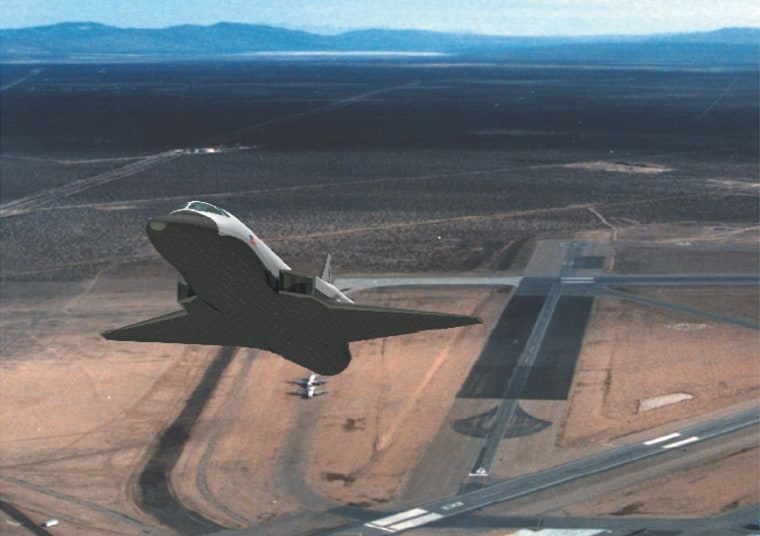Legislation that would make it easier for private space tourism to take flight is finally set to move forward after months of behind-the-scenes negotiations, key players told MSNBC.com Thursday.
The bill — known as the Commercial Space Launch Amendments Act of 2004, or — lays out the definition of a suborbital space passenger vehicle, solidifies the process for licensing such vehicles, and allows paying passengers to fly into space at their own risk.
The House of Representatives approved the measure by a 402-1 vote in March, but it languished in the Senate because of concerns that the House version might exclude some rocket-jet hybrid vehicles.
An Oklahoma-based company that is developing just such a vehicle, Rocketplane Ltd., was among those most concerned; as a result, Sen. James Inhofe of Oklahoma had held back the legislation for revision. Inhofe's office said Thursday that the revised bill was now ready for further action, most likely after the summer recess.
"It's on a good track now," Inhofe spokesman Ryan Thompson told MSNBC.com. "It's headed in a good direction, and the senator's pleased."
The X Prize factor
Last month's milestone spaceflight of the privately developed SpaceShipOne rocket plane and the positive buzz over the $10 million Ansari X Prize helped push the measure forward, said James Muncy, a space policy consultant at Virginia-based Polispace.
"There's no reason this can't be passed by the Senate in September and sent back to the House," Muncy told MSNBC.com. The bill would likely be amended by the Senate Commerce Committee, based on "preconferencing" with the House, then approved in the Senate by unanimous consent, he said.
Passage isn't quite a done deal, however. Other lawmakers could challenge the revised language, or the measure could get buried in the press of other business when Congress returns in September.
“The American people have the next six weeks with their senators back home, asking for their votes, and they can tell the senators, ‘Hey, this is a very good piece of legislation.’” Muncy said. “Now is the time when Congress is focused on this. Now is when the American people are thinking about the future, watching what [SpaceShipOne team leader] Burt Rutan and the other X Prize contestants are doing, and they're saying, ‘We want to play. We want to be part of this.’”
Debate over definitions
The months-long holdup had to do primarily with language defining suborbital space vehicles, which fall under the oversight of the Federal Aviation Administration's Office of Commercial Space Transportation. The definition is considered important because any vehicle that doesn't fit the description might have to go through the far more stringent licensing process for commercial aircraft, which is managed by a different part of the FAA.
The House version of the bill followed the definition already established by the FAA: "a rocket-propelled vehicle intended for flight on a suborbital trajectory whose thrust is greater than its lift for the majority of the powered portion of its flight."
Officials at Rocketplane, however, was concerned that such a definition didn't fully address hybrid vehicles that fly like jet airplanes to reach a staging area, then light up their rocket engines for a quick, steep ascent to space. The revised language focuses more specifically on how the vehicle is powered during the crucial ascent.
"Basically, it includes hybrid vehicles," Thompson said.
Impact of new rules
The FAA already has awarded suborbital launch licenses for piloted vehicles being developed by two companies — Rutan's Scaled Composites as well as XCOR Aerospace, both based in Mojave, Calif. But if H.R. 3752 becomes law, suborbital space companies will be on firmer legal ground when they apply for licenses.
In addition, the licensing process would become more streamlined, and for the first time, private companies would be allowed to fly paying passengers into outer space — as long as the would-be passengers signed forms acknowledging that they were flying at their own risk.
Writing such provisions into law could help space travel companies attract more investment from potential investors — ranging from software billionaire Paul Allen, who is backing the experimental SpaceShipOne effort, to Virgin adventurer/billionaire Richard Branson, who has repeatedly voiced interest in the field.
"If you really are building a launch vehicle, you want to be able to fly for revenue with a license," Muncy said. "This new legislation will make absolutely clear that you can do that."
